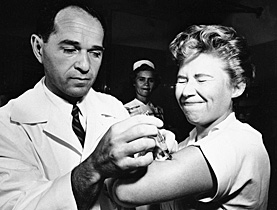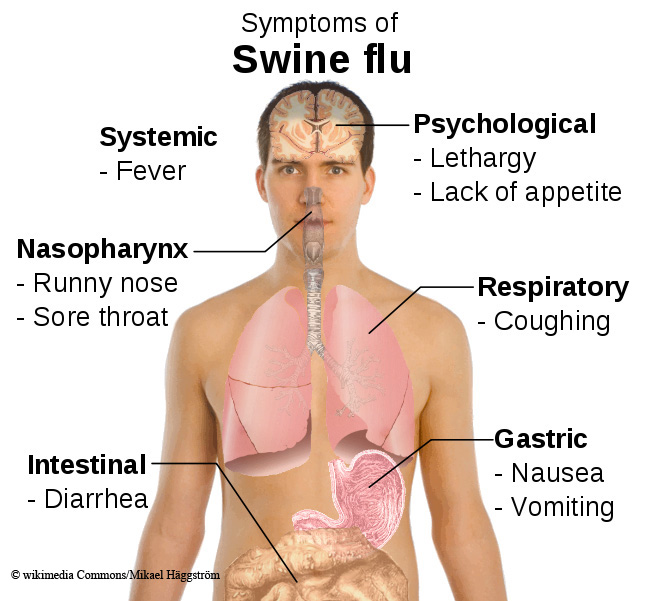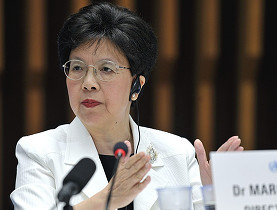Rise of swine flu prompts vaccination doubts

To vaccinate or not to vaccinate – that is the question facing many Swiss concerned about the rising number of people with swine flu.
Public health authorities in Switzerland have recommended immunisations for vulnerable segments of the population but controversy is heating up, with opponents criticising the latest government recommendations.
The Federal Vaccination Office says opponents are “acting irresponsibly”.
Inoculating the entire population is presently not necessary, according to the Vaccination Office. Instead it prioritises jabbing people in risk groups and those who have contact with those especially at risk, including health workers, people who deal with newborns and pregnant women.
It also advises children older than six months to be vaccinated, as well as adults up to age 64 who have chronic heart and lung problems or metabolic diseases.
The Federal Health Office estimates that between 1.2 and two million people in Switzerland fall into these risk groups.
Opponents dismiss all this – not only doubting the efficacy of swine flu vaccinations but they also warn of side effects. “Every vaccination is a harmful action,” says the website of Aegis, an organisation that believes vaccination damages the body’s natural immune system.
Don’t protect?
Aegis spokeswoman Anita Petek-Dimmer told swissinfo.ch that the annual winter flu vaccination has shown an efficacy rate of only between ten and 30 per cent.
The World Health Organization (WHO) on the other hand says vaccines are among the most important medical interventions for reducing illness and deaths during a pandemic.
“Influenza vaccines have been used for more than 60 years and have an established record of safety in all age groups. While some serious adverse events have been reported, these have been rare,” the organisation said on its website.
Aegis criticises latest recommendations from the Federal Vaccination Office. “It’s the same old story that only healthy people should get vaccinated. If an ill or even seriously ill person is vaccinated, the risk increases of severe complications as a result of the jab.”
The Federal Health Office’s vaccination section says there is no evidence of particular risks.
“People who recommend against vaccinations are acting irresponsibly,” said Hans Binz, vice-president of the Vaccination Office.
Binz told the Tages-Anzeiger newspaper that the risk of side effects was one thousandth that of falling seriously ill with A/H1N1.
Profit
For its part, the Federal Health Office is counting on around two million cases of the A/H1N1 virus by autumn – as of Tuesday there were 841 confirmed cases – and has ordered 13 million doses at a cost of SFr84 million ($80 million). This is enough for all of Switzerland’s 7.7 million inhabitants.
But Petek-Dimmer from Aegis thinks this is “pointless”. “The Federal Health Office spends millions on vaccines but at the same time says washing your hands and ‘hygienic coughing’ are an alternative to vaccines – one wonders why it has actually bought the vaccine,” she said.
She assumes there’s at least one bar of soap in every Swiss household. “Washing your hands is not only hygienic but doesn’t trigger side effects.”
The issue, as Petek-Dimmer sees it, is that no one makes a profit with hand washing – swine flu is benefiting not only researchers but also industry.
The Basel pharmaceutical company Roche for example recently announced that sales of its anti-flu drug Tamiflu for the first half of 2009 had trebled over the same period in 2008 to around SFr1 billion.
General wariness
As soon as enough vaccine is available, the Federal Vaccination Office will recommend it to everyone who wants to protect themselves and those around them from the A/H1N1 virus.
The Swiss authorities estimate that vaccinations will be able to start in October. Hans Binz is aiming for a vaccination rate of 95 per cent.
But according to a Federal Health Office survey at the end of June, only 27 per cent of respondents were prepared to be vaccinated.
This is not the first time the Swiss authorities have been embarrassed by a general wariness – not to mention ignorance – regarding vaccines.
The WHO believes Europe could wipe out measles in 2010 if 95 per cent of the population were vaccinated – in Switzerland however the rate is estimated at 86 per cent on average, falling in some German-speaking cantons to 70-75 per cent.
Last year Switzerland experienced its worst measles epidemic since mandatory reporting of the disease in 1999 and another epidemic in March threatened to compromise the fight against the highly contagious disease in other European countries.
Corinne Buchser and Geraldo Hoffmann, swissinfo.ch (adapted from German by Thomas Stephens)

More
Pandemic
Avoid close contact with people who appear unwell and who have fever and cough.
Wash your hands with soap and water frequently and thoroughly.
Practise good health habits including adequate sleep, eating nutritious food and keeping physically active.
The Federal Health Office says it will test a vaccine in September. It could be introduced in October.
It will then have to be licensed by the national licensing authority, Swissmed. Switzerland has ordered 13 million doses.
The Swiss Federal Health Office has projected that up to two million Swiss could catch swine flu. Some 400,000 people could consult their doctor over suspected swine flu. Some 1,000 people could be hospitalized and of these 150 people would need intensive care treatment, it said.
Adults and children who are severely ill with H1N1 flu or at high risk of complications should be treated with antivirals like Tamiflu, the World Health Organization (WHO) said. But otherwise healthy people with mild flu-like symptoms need not be given the drugs to combat swine flu.


In compliance with the JTI standards
More: SWI swissinfo.ch certified by the Journalism Trust Initiative




You can find an overview of ongoing debates with our journalists here. Please join us!
If you want to start a conversation about a topic raised in this article or want to report factual errors, email us at english@swissinfo.ch.